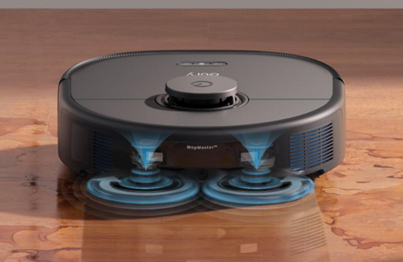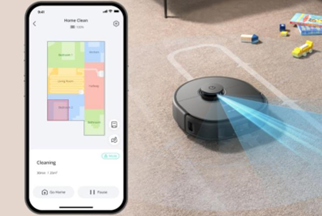When it comes to maintaining the pristine condition of hardwood floors, choosing the right vacuum is crucial. Robot vacuums and traditional vacuums both promise to keep your floors spotless, yet they each have their own set of advantages and limitations. In this blog, we’ll dive deep into the strengths and weaknesses of both types of vacuums specifically for hardwood floors. By the end, you’ll have a clearer understanding of which type best fits your home cleaning needs.

Traditional Vacuums: Strengths and Limitations
Traditional vacuums have long been the go-to for cleaning, especially when it comes to deep cleaning tasks. While they are effective, they come with both strengths and limitations.
Suction Power and Deep Cleaning
Traditional vacuums are known for their powerful suction, effectively cleaning various surfaces, including hardwood floors. Equipped with different attachments, they can reach gaps between floorboards to remove dirt and debris. This strong suction makes traditional vacuums especially efficient at thoroughly eliminating dust and larger particles, ensuring a deep and comprehensive clean for your home.
Versatility Across Floor Types
Traditional vacuums offer great versatility, easily transitioning between hardwood floors, carpets, rugs, and tiles. By adjusting settings or using specialized attachments, users can efficiently clean various floor types. This adaptability makes traditional vacuums a preferred choice for homes with mixed flooring, ensuring thorough cleaning across all surfaces with minimal effort.
Manual Operation and User Control
Traditional vacuums provide full control over the cleaning process, allowing users to maneuver around obstacles and reach every corner. However, this manual operation can be physically demanding and time-consuming, making it less convenient for those seeking a more effortless cleaning solution. The need for constant attention can be a significant limitation for individuals with busy lifestyles.
Robot Vacuums: Features and Benefits
In contrast, robot vacuums have revolutionized floor cleaning by offering convenience and automation. These vacuums handle the cleaning process with minimal intervention, but they also have features that make them ideal for maintaining hardwood floors.
Autonomous Cleaning and Smart Scheduling
Robot vacuums offer exceptional convenience by cleaning autonomously. Through app or remote control scheduling, they can operate while you’re away, ensuring your floors stay clean without manual intervention. This hands-free feature saves time and fits seamlessly into busy lifestyles, maintaining spotless hardwood floors with minimal effort. Enjoy the ease of automated cleaning, making your home cleaner and more organized without constant attention.
Advanced Navigation and Obstacle Avoidance
Modern robot vacuums are equipped with advanced navigation systems and sensors that help them move around furniture, avoid obstacles, and clean methodically. This precision is particularly beneficial for hardwood floors, preventing scratches while ensuring thorough and efficient cleaning. With these technologies, your floors stay spotless and well-protected, giving you a seamless and worry-free cleaning experience.

Performance on Hardwood Floors
Robot vacuums are ideal for hardwood floors, featuring specialized brushes and suction mechanisms that effectively capture fine dust and small debris without scratching. Although their suction may not match high-end traditional vacuums, their consistent, daily cleaning ensures your floors remain spotless with minimal effort. These vacuums are perfect for maintaining cleanliness in between deeper cleans, offering convenience and ease for everyday floor care.
Side-by-Side Comparison: Which One Wins?
Now that we’ve discussed the strengths of both types of vacuums, it’s time to compare their overall performance in several key areas. Consider the following factors when making your choice between a traditional or robot vacuum.
Cleaning Performance and Efficiency
Traditional vacuums provide powerful suction for deep cleaning, perfect for occasional thorough sessions. On the other hand, robot vacuums offer regular, autonomous cleaning, ensuring consistent cleanliness with minimal effort. The choice between the two depends on whether you prefer intensive deep cleaning or the convenience of hands-free, everyday maintenance for ongoing cleanliness.
Maintenance and User Effort
Traditional vacuums require significant effort, including manual operation and frequent maintenance like changing bags and filters. In contrast, robot vacuums reduce daily effort, needing only occasional dustbin emptying and sensor cleaning. For those who value convenience and efficiency, robot vacuums are the clear choice, providing a more automated, effortless cleaning experience that saves time and energy.
Cost and Long-Term Value
Traditional vacuums have a lower upfront cost but may require additional attachments and frequent maintenance, increasing long-term expenses. While robot vacuums involve a higher initial investment, they save time and reduce manual effort, offering potential long-term value by providing efficient, hands-free cleaning. Consider both initial costs and ongoing maintenance when choosing the right option.
Conclusion
Choosing between a traditional vacuum and a robot vacuum for hardwood floors depends on your specific needs and lifestyle. Traditional vacuums excel in powerful, deep cleaning, while robot vacuums offer unmatched convenience and consistent maintenance. Evaluate your cleaning routines and preferences to decide which best matches your home environment. Both types have their merits, ensuring that your hardwood floors remain clean and well-maintained.